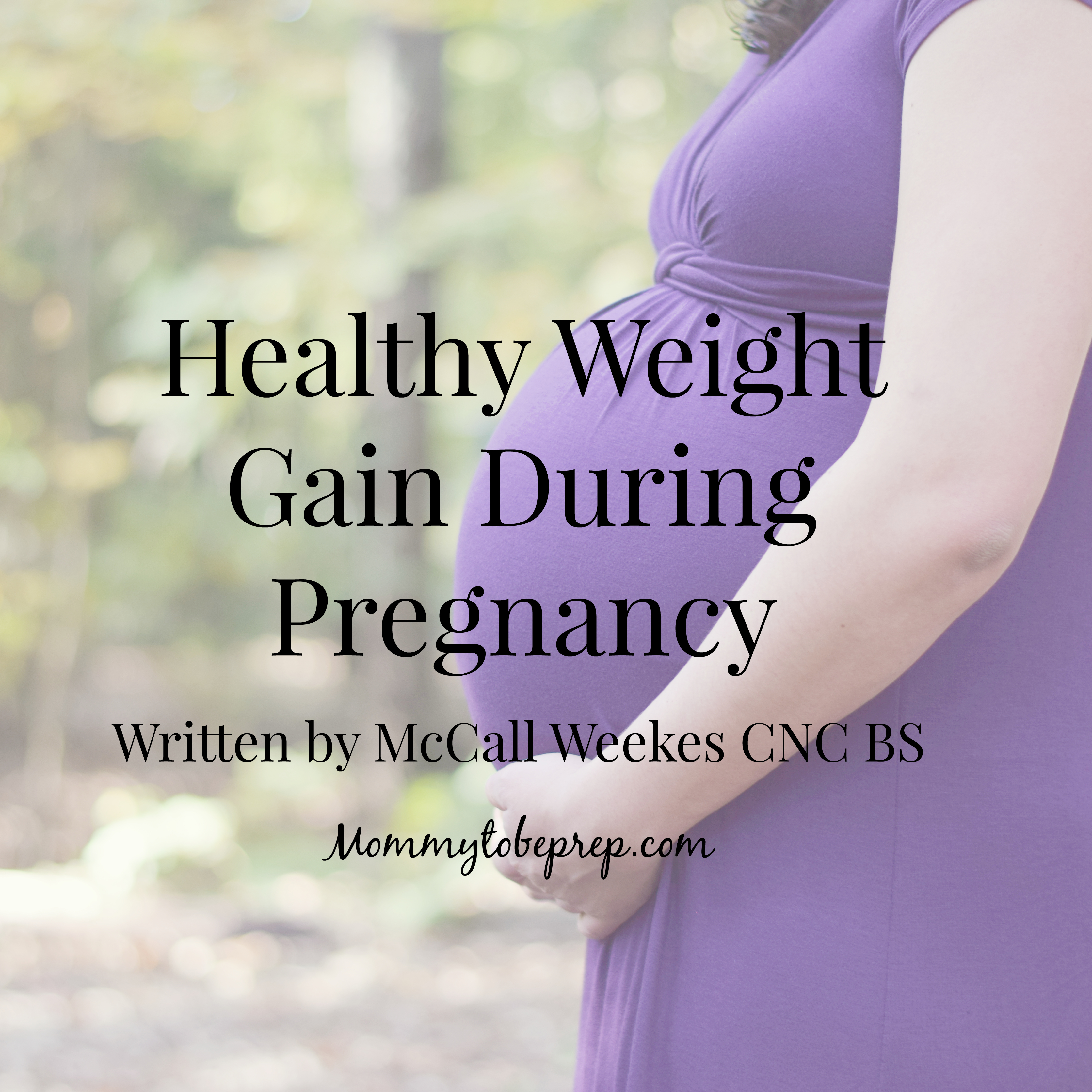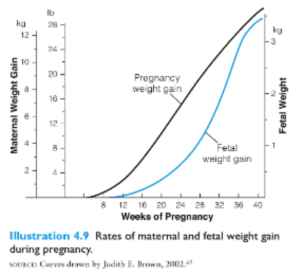Healthy Weight Gain During Pregnancy

Now the infamous phrase… “But, I am eating for two…”
True, a pregnant woman is responsible for eating enough for both the baby and herself to survive, but sometimes that can go a little bit overboard. In other cases, some expectant mothers become afraid of how much weight they have or will gain and restrict their diet. Neither is healthy for mom or baby. This topic is important because of the increased rate of gestational diabetes and lack of communication between expectant mothers and physicians. Telling a woman her weight gain is not optimal for her pregnancy is a hard conversation to have with anyone. After all, the health of your baby starts with you!
Physiological Changes During Pregnancy
Additionally, let’s talk about the physiological changes, which occur in the body during pregnancy. During the time of our own mothers’ pregnancies, physicians would encourage certain diet restrictions such as low sodium diets, iron supplements, and minimal weight gain. Lucky for us, we now know that what once was considered “abnormal” is actually “normal” for a woman who is pregnant.(1,2) Here is just a short list of the physiological changes:
- Blood volume increases by 70%
- Concentrations of many vitamins and minerals in the blood are increased
- Increased concentrations of cholesterol and fats in the blood
- Increases glucose and insulin in the blood
- Organ enlargement
- Increased heart rate and decreased blood pressure
- Increased respiratory rate and oxygen consumption
- Increased appetite and food intake and thirst
- Increased constipation
- Increased urine filtration
- Suppressed immunity with risk of urinary and reproductive tract infection
- Increased basal metabolic rate
- Placental secretions of large amounts of hormones needed to support physiological changes of pregnancy
You can see how your body naturally prepares itself to create and preserve life and in a few ways, that includes gaining weight. This is a widely debated topic but there are some general dietary guidelines to keep you within a healthy amount of weight gain. Let’s first cover what mom and baby use for energy.
Energy Source
Carbohydrates are the main source of energy for the fetus. As natural shifts occur in the mother’s body, more carbohydrates are supplied to the baby and the mother relies more on stored fat for her energy. If the mother loses any weight during the pregnancy, the baby is at risk of not getting enough carbohydrates and may have impaired growth and intellectual development.(3) Protein is also needed in extra amounts as it is used to synthesize new maternal and fetal tissues. As stated above, fats are also increased in the blood stream to be used as energy for mom.
Cholesterol levels are also increased to allow the placenta to synthesize steroid hormones and nerves, as well as cell-membrane function. All of these levels should return to normal post-partum. Anyone heard the phrase, “this baby is a parasite”? That is a) rude and b) untrue. The fetus is unable to “steal” whatever nutrients it needs from mom, which means that mom must eat more and supply those extra nutrients for the fetus.(1)
Weight Recommendation and Pregnancy
Now to the discussion and recommendation of healthy weight gain, which has been given to ensure that babies are born at a healthy size. Correct weight gain during pregnancy all depends on mom’s weight before she becomes pregnant. The higher her weight pre-pregnancy, the lower the weight gain needed during pregnancy. The lower mom’s weight pre-pregnancy, the more weight she needs to gain during pregnancy.(4) Recommendations are as follows:
| Weight | BMI | lbs | kg |
| Underweight | < 18.5 | 28—40 | 12.7—18.2 |
| Normal weight | 18.5—24.9 | 25—35 | 11.4—15.9 |
| Overweight | 25—29.9 | 15—25 | 6.9—11.4 |
| Obese | 30+ | 11—20 | 5.0—9.1 |
| Twin pregnancy | — | 25—54 | 11.4—24.5 |
How to determine what weight category you are depends on your *Body Mass Index (BMI), which is found using this formula:
Weight (kg)÷Height (m²) =BMI
For those of us not using the metric system, take your weight in lbs. and divide it by 2.2 to get kilograms. Then take your height in feet and divide by 3.28 to give you meters. Here is an example:
135 lbs/2.2 lbs = 61.4 kg 5.5 ft/3.28 ft = 1.67 m
Surprisingly, only 31% of U.S. women gain weight within the recommended amount. Gaining the proper amount of weight can significantly lower your risk of delivering a low-birth weight baby by about half! Gaining too much weight can lead to a large baby, C-sections, and postpartum weight retention.(5) Many concerns about excessive weight gain during pregnancy have lead to the assumption that it may increase the risk of obesity in children. Approximately 3-5 pounds should be gained in the first trimester and then gradual and consistent weight gain throughout the rest of the pregnancy. Weight gain may slow down just slightly as the due date approaches. Refer to the graph below for a general idea of maternal and fetal weight gains during pregnancy.
Calorie Intake
This type of weight gain can be achieved by in taking an average of 300 extra calories per day. This is a very general recommendation and each woman may require a little more or a little less depending on her situation.(6) 300 calories is not that much. Some examples are:
- Medium apple and 2 TBS of peanut butter
- Small container of yogurt, granola, and a medium banana
- Multigrain chips and hummus
- Protein bar
- Veggies and ranch
There are all kinds of snacks that are 300 calories. What happens to all these pounds if the baby is born weighing in at only 7 lbs? Most of the increased weight is accounted for in the extra tissue mom has accumulated over the last 9 months. As her body is no longer supporting life, that tissue will eventually go away as weight is lost postpartum.
Conclusion
Being a mom and having the opportunity to create and support life is a wonderful blessing. Taking care of our body during this process is so important for not only mom’s health but for the baby’s growth and development. If you have any questions about your weight gain during pregnancy, don’t hesitate to talk to your physician. Ask for recommendations from your doctor as to how you can keep yourself on track to give your baby the healthiest start possible.
*BMI has been disputed as being a reliable source when determining a person’s weight category. It has proven to be helpful on the two ends of the spectrum, underweight and obese. For the purpose of this blog post, the estimate of BMI will work just fine.
About The Author:
 McCall Weekes is a certified Nutrition Consultant with a B.S. (Bachelors of Science) in Nutritional Science from Brigham Young University in Provo, Utah. McCall is a private nutrition consultant in the Utah region with a strong online presence including clients all over the world. McCall is passionate about helping others change their lives by becoming both mentally and physically stronger. McCall is especially interested in coaching pre and post natal mothers due to their strong drive. She states, “Pre/post natal mothers are some of my favorite clients because they are so willing to change if it means bettering the life of their child. The bond between mother and baby is such a beautiful thing.” Visit anewtritionlife.com to learn more and get %10 off your next service when you mention mommytobeprep!
McCall Weekes is a certified Nutrition Consultant with a B.S. (Bachelors of Science) in Nutritional Science from Brigham Young University in Provo, Utah. McCall is a private nutrition consultant in the Utah region with a strong online presence including clients all over the world. McCall is passionate about helping others change their lives by becoming both mentally and physically stronger. McCall is especially interested in coaching pre and post natal mothers due to their strong drive. She states, “Pre/post natal mothers are some of my favorite clients because they are so willing to change if it means bettering the life of their child. The bond between mother and baby is such a beautiful thing.” Visit anewtritionlife.com to learn more and get %10 off your next service when you mention mommytobeprep!
Works Cited
- King, J.C. Physiology of pregnancy and nutrient metabolism. Am J Clin Nutr 2000; 71:1218S-25S.
- Rosso, P. Nutrition and metabolism in pregnancy. New York: Oxford University Press, 1990: 117-118, 125, 150-151.
- Butte, N. F. Carbohydrate and lipid metabolism in pregnancy: Normal compared with gestational diabetes mellitus. Am J Clin Nutr 2000; 71:1256S—61S.
- Rosso, P. et al. Intrauterine growth retardation: A new systematic approach based on the clinical and biochemical characteristics of this condition. J Perinat Med 1974; 2:147-60.
- Pregnancy Nutrition Surveillance, www.cdc.gob/pednss/pdfs/PNSS_2009.pdf.
- Hytten, F. E. and Leitch, I. The physiology of human pregnancy. Oxford: Blackwell Scientific Publications, 1971.
